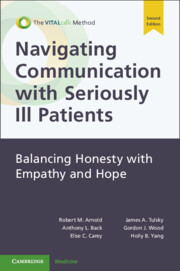Book contents
- Navigating Communication with Seriously Ill Patients
- Navigating Communication with Seriously Ill Patients
- Copyright page
- Dedication
- Reviews
- Contents
- Preface
- Acknowledgments
- 1 Taking Your Skills to the Next Level
- 2 Foundational Communication Skills
- 3 Talking about Serious News
- 4 Discussing Prognosis
- 5 Planning for the Future: Discussing What’s Important, Well Before a Crisis
- 6 Discussing Treatment Decisions
- 7 Between the Big Events
- 8 Goals of Care in Late-Stage Disease
- 9 Conducting a Family Conference
- 10 Dealing with Conflicts between Clinicians and Patients
- 11 Working Through Conflicts with Colleagues
- 12 When You’re Really Stuck
- 13 Talking about Dying
- 14 Cultivating Your Skills
- Index
- References
11 - Working Through Conflicts with Colleagues
From “Being Right” to “Making Things Right”
Published online by Cambridge University Press: 05 April 2024
- Navigating Communication with Seriously Ill Patients
- Navigating Communication with Seriously Ill Patients
- Copyright page
- Dedication
- Reviews
- Contents
- Preface
- Acknowledgments
- 1 Taking Your Skills to the Next Level
- 2 Foundational Communication Skills
- 3 Talking about Serious News
- 4 Discussing Prognosis
- 5 Planning for the Future: Discussing What’s Important, Well Before a Crisis
- 6 Discussing Treatment Decisions
- 7 Between the Big Events
- 8 Goals of Care in Late-Stage Disease
- 9 Conducting a Family Conference
- 10 Dealing with Conflicts between Clinicians and Patients
- 11 Working Through Conflicts with Colleagues
- 12 When You’re Really Stuck
- 13 Talking about Dying
- 14 Cultivating Your Skills
- Index
- References
Summary
Conflict with our colleagues is stressful and evokes strong emotion, yet handled well can improve outcomes and relationships and enhance collaboration. There are issues of hierarchy, power, and respect. Similar to dealing with conflict with patients is the need to establish a safe space, practice deep listening, and earn trust. Being open to exploring the breadth of the problem, both parties perspectives, your role in the conflict, how you feel about events, and what it means to you will help you approach the situation with a more open mind. Keeping a focus on improving the situation and relationship rather than solely on being right will help maintain calm. The roadmap for conflict with colleagues includes noticing when conflict is bubbling up, preparing your approach instead of jumping in reactively, starting softly to avoid provoking defensiveness, inviting the other person’s perspective before you share yours, using neutral language to reframe emotionally charged issues, acknowledging the emotion of the situation (rather than handling your colleague’s emotions directly), and finding a path forward that addresses both parties’ concerns, creating new options where needed.
Keywords
- Type
- Chapter
- Information
- Navigating Communication with Seriously Ill PatientsBalancing Honesty with Empathy and Hope, pp. 167 - 184Publisher: Cambridge University PressPrint publication year: 2024



